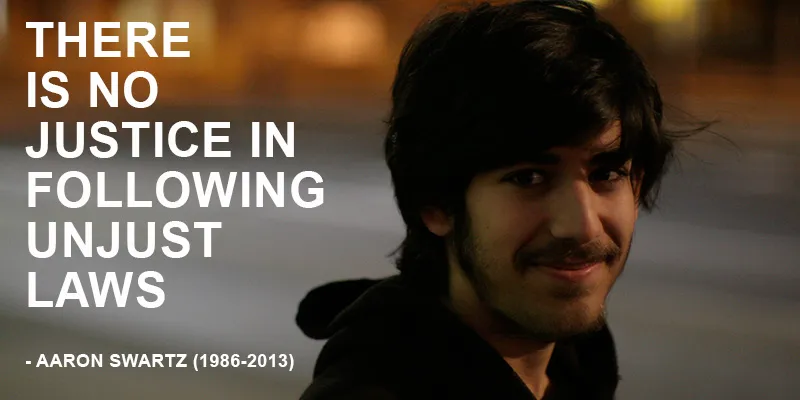[Techie Tuesdays] Aaron Swartz - The Eklavya of our times
Some people cherish sitting behind a screen and writing a code to improve the world while others prefer working in cubicles. We are not stating that one is right and the other is wrong because in this world we need a balance of both. In our quest to discover new techies for Techie Tuesday’s column, we may have overlooked some of the biggest techies in the world. Those techies may have inspired many of us to write that first line of a code and become who we are. This week we write about one such legend whose name is probably unheard of to people who are outside the tech and activism world.
Aaron Swartz was an activist and a hacker who in his short time on Earth changed the world in more ways than anyone would have imagined. He was found dead in his apartment on 11th January 2013.
Let’s rewind a little bit. Aaron Swartz was indicted by the Federal Jury on multiple charges of wire and computer fraud, unlawfully obtaining information from a protected computer and recklessly damaging a protected computer. This case brought him nationwide attention and he was seen as an expert when it came to issues related to Internet freedom, piracy and legal issues related to computer use.

At 14 years old, Aaron was involved in authoring the RSS 1.0 standards, which became a landmark in the history of content syndication on the Internet. Most of the members who were coauthoring the RSS 1.0 Standard were surprised to know that he was just a 14-year-old boy. He became the member of W3C consortium and played an instrumental role in co-creating Markdown format, a markup standard derived from HTML.
It was during his graduation, when Aaron joined the first batch of YCombinator and started working on Infogami. He also helped in creating the web.py framework. Soon Infogami merged with Reddit which was later acquired by Conde Nast Publications. Aaron found it difficult to work in the new environment and eventually quit. During this time, he was getting inclined towards activism.
Later on, he found Watchdog.net to aggregate data about politicians and wrote the “Guerilla Open Access Manifesto” urging people to share closed educational resources. He had left the content open so that everyone could use it. In order to learn more about activism and laws, Aaron joined the Progressive Change Campaign Committee. Soon he started his own organization, Demand Progress, an online site where people can organize and contact their leaders. He also researched about political corruption and found a huge amount of evidence related to corruption in legal areas.
Aaron attracted the attention of FBI when he downloaded and released about 2.7 million court documents stored in the PACER (Public Access to Court Electronic Records) database, which was managed by the US courts Administrative office. But since these documents were already public, FBI could not press any charges against him.
The FBI got a second chance when Aaron downloaded around 4 million research papers from JSTOR (Journal Storage) using an unauthorized computer from MIT. Soon he was caught by MIT police and was apprehended. The intent behind all the downloads could not be made clear. Later JSTOR dropped the charges and he was out on bail after paying a $100,000 fine. The case was pursued by the US government despite the disinterest shown by JSTOR end. In order to set an example out of him, the prosecutors still pressed charges and asked him to plead guilty to 13 federal crimes in exchange for a proposal to spend only six months in a low security prison. He opted to go for trial and as a result of the trial he was awarded 35 years in prison and over $1,000,000 in fine. As the pressure mounted, Aaron committed suicide on 11th January 2013.
The story of Aaron Swartz is nothing less than an inspiration for people. Aaron sacrificed his life for the freedom of information.
Many Internet activists give an analogy of Eklavya from Mahabharata, where Eklavya was asked to sacrifice his thumb in the name of gurudakshina so that he cannot pursue his only passion, the knowledge that he gained. This prevented him from overshadowing Arjuna, who was the favorite pupil of Dronacharya, Eklavya’s symbolic teacher.
You might also like
[Techie Tuesdays] Kailash Nadh – the techie who knows how to ‘make it large’
[Techie Tuesdays] A ‘CHIP’ off the old block, Kiran Jonnalagadda – Founder, HasGeek






![[Techie Tuesdays] Aaron Swartz - The Eklavya of our times](https://images.yourstory.com/cs/wordpress/2014/07/AARON.jpg?mode=crop&crop=faces&ar=2:1?width=3840&q=75)




